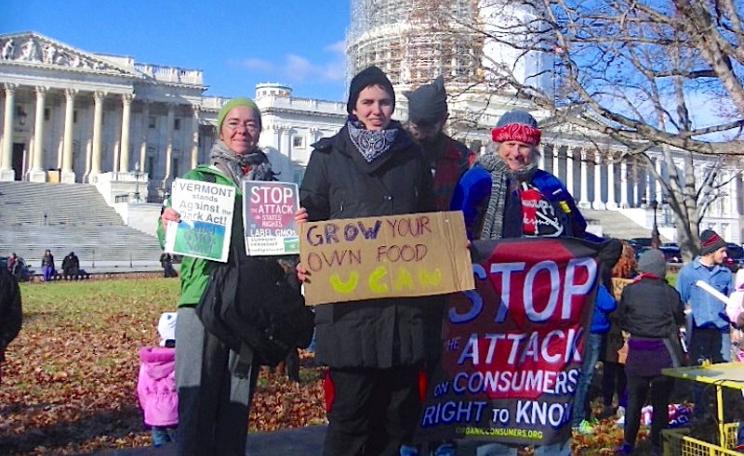Family farmers already have the right to farm. Now we'll be passing those same rights on to big corporations, big agriculture, Monsanto, the rest of that crew.
Farmers in Missouri can relax: nobody's going to be taking their tractors away anytime soon.
In a statewide referendum yesterday, Missourians narrowly approved Amendment 1, a controversial ballot measure changing the Missouri constitution to formally guarantee "the right of ranchers and farmers to engage in ranching and farming practices."
Constitutional Amendment 1 received 498,751 votes in favour and 496,223 against - a win by a margin of less than 0.3%.
The wording of the amendment sounds innocuous: a simple acknowledgement of the state's pride in its rural economy and its 100,000 farms.
Opponents of the amendment, however, warn that the loosely phrased measure, which squeaked through by just 2,500 votes out of almost a million cast, opens the door to a wide range of fresh abuses by industrial farming operations.
A victory for corporate agriculture
While the constitutional "right to farm" won't affect federal laws or regulations, it could be used by industrial farming groups to slap down state regulators, to fend off lawsuits, and to prevent the passage of new rules aimed at improving environmental, health and welfare standards in the farming sector.
"Its backers are thinking that this will give them a broad-spectrum protection against efforts to limit the agricultural community", explains University of Missouri constitutional scholar Peverill Squire.
And while proponents frame the amendment as providing protection for family farms, the fact is that Missouri, like every other state in the union, already has right-to-farm legislation that explicitly protects small, traditional farmers, chiefly by shielding them from nuisance lawsuits.
That means the new amendment most clearly benefits the big corporations and multinational agribusinesses excluded from existing statutes.
"Family farmers already have the right to farm", explains Wes Shoemyer, a farmer and former state senator who led the opposition to Amendment 1. Now, he says, "we'll be passing those same rights on to big corporations, big agriculture, Monsanto, the rest of that crew."
Just how sweeping those rights will prove remains to be seen. Legal scholars say that the amendment, as written, is so vague as to be almost meaningless.
It will take lengthy legal battles to determine just how much leverage the new amendment grants agribusinesses in their struggles with regulators and watchdogs, says Rusty Rumley, a senior staff attorney at the National Agricultural Law Center.
"How broad it's going to be, we're not going to know until courts take a look at the amendment and give their interpretation of it ... It's up in the air until that point", he says.
A 'constitutional firewall' against democracy
While ALEC, the conservative legislation mill, has been pushing business-friendly tweaks to state 'right-to-farm' legislation since the mid-1990s, the Missouri amendment campaign was primarily triggered by a 2010 ballot measure in which the state's voters approved new regulations for puppy mills.
Family farmers already have the right to farm. Now we'll be passing those same rights on to big corporations, big agriculture, Monsanto, the rest of that crew.
Agribusiness groups saw that as the first step towards democratic action like that seen recently in California and Oregon, where voters backed measures banning genetically modified crops and intensive livestock rearing methods.
The right-to-farm amendment was therefore conceived of as a deterrent and a constitutional firewall against such threats, says Blake Hurst, the president of the Missouri Farm Bureau, which helped organise and fund the pro-amendment campaign.
"What they want is to tell us that we can't use any agricultural technologies developed later than the 1950s", Hurst says. "Our industry is under threat from people who don't understand how very difficult it is to raise a crop."
Hurst frames the effort to pass the amendment as an existential struggle to protect small farmers against meddlesome outsiders - especially the Humane Society, which he says wants to "outlaw livestock farming" in the state.
That's untrue, but it's been an effective campaign message for the pro-amendment crowd, says former Missouri Lt. Gen. Joe Maxwell, now the Humane Society's head of outreach and engagement.
"The Farm Bureau has tried to make the Humane Society and other animal welfare organisations into boogeymen", he says. "It's been a challenge for us to get past the message they've been putting out there."
A torrent of cash - but where did it all come from?
The no campaign's efforts were further hindered by the torrents of cash that have poured into the yes campaign's coffers from agribusiness trade groups.
In all, Missouri Farmers Care, the main pro-amendment campaign committee, spent about $630,000 in the run-up to the vote, funded in large part by big donations from the state's soybean, pork, cattle and egg trade groups.
The size of those donations led some opponents of the measure to cry foul, since the groups in question are funded in part by 'check-off' fees - a kind of tax paid by crop producers to fund industrywide marketing efforts. The sheer volume of donations might suggest that some check-off funding was improperly used for political purposes, opponents say.
Even if the donations were properly sourced, the amount of cash swilling around corrupted the political process, and made it far easier than it should have been for business groups to force the amendment onto the ballot, says Shoemyer, the former state senator.
Ultimately, Republicans passed legislation putting the 'right to farm' amendment before voters as a way to curry favor with deep-pocketed donors, Shoemyer asserts:
"This is an inside job! These guys are for sale. This is a symptom of how bad and out of control a legislature can get."
Protecting GMOs and animal cruelty
Either way, experts say that the successful passage of the Missouri amendment is likely to spark similar efforts in other states. "This is a move that's being promoted all across the Midwest and in all the agricultural states", says agricultural economist John Ikerd.
North Dakota passed a 'right-to-farm' amendment last year, and the defeat of a similar effort in Indiana led lawmakers to push through legislation designed to have essentially the same effect.
As of last month, Indiana officials were effectively banned from curbing farmers' ability to plant GMO seeds, or to use inhumane or environmentally damaging agricultural methods, says Hoosier Environmental Council lawyer Kim Ferraro.
"It's protecting their right to do what they want, and the law needs to get out of the way", she says.
A constitutional 'rush to the bottom'
The Missouri result will inevitably ramp up pressure on legislators in other states to enact similar measures, either through statutory reform or through constitutional amendments, Ferraro says.
Ikerd agrees, noting that agricultural giants will likely threaten to move their operations away from states that fail to embrace the corporate 'right to farm' movement.
"Similar amendments are going to be in all the major agricultural states within the next election cycle", he predicts.
And the damage done in that regulatory and constitutional rush to the bottom could take years or decades to set right.
Ben Whitford is The Ecologist's US correspondent. He can be reached atben@theecologist.org, or on Twitter at @ben_whitford.







